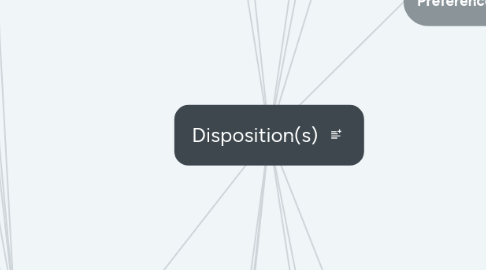
1. Temperament
1.1. Care
1.2. Anxiety
1.3. Nausea
2. Self
2.1. sense
2.1.1. common
2.1.2. of direction
2.2. Ego
3. Heart
3.1. Soul
3.1.1. Faculties
3.1.1.1. Mind
3.1.1.2. affections
3.1.1.3. will
3.1.1.4. conscience
3.1.1.5. memory
3.1.1.5.1. is not just a faculty - Gadamer p16
3.1.2. Facilities
3.1.2.1. Body
3.1.2.1.1. dexterity
3.1.2.1.2. Health
3.1.2.2. Senses
3.1.2.2.1. sight
3.1.2.3. The interface of Being-in-the-world
3.2. Nous
3.3. Spirit
3.4. Core
3.5. Ghost /Geist
4. Personality
4.1. Attitude
4.1.1. Mindset
4.1.1.1. Knobel Lankshear 2006
4.1.1.1.1. epistemological shift?
4.1.1.2. Watson 2011
4.1.2. State
4.1.3. Bent
4.1.4. Prejudice
4.1.5. Conviction
4.1.6. Tendency
4.2. Character
4.2.1. Trait
4.2.1.1. Leadership Theory
4.3. Inherent
4.3.1. Paskevicius, M. and Irvine, V., 2019 JIME
4.4. Identity
4.4.1. ethopoietic fashion
4.4.1.1. what else does this?
4.4.1.1.1. enrolment?
4.4.1.1.2. participation as rites of passage
4.4.1.1.3. Graduation
4.5. Demeanour
4.6. Nature
4.6.1. innate
4.6.1.1. In law
4.6.2. Misawa 2020
4.6.2.1. Bonnett's 'Self-arising'
4.6.3. Hume(!)
4.6.3.1. On Human Nature
4.7. Type
4.7.1. introvert
4.7.2. extrovert
4.8. Inveterate
4.9. Intrinsic
4.10. Fundamental
4.10.1. Elemental
4.11. Name
4.12. Ethos
4.13. Habitus
4.13.1. "Habitus is the evolving personality structure of the individual" Gallagher 2018, p192
4.13.2. identifies aspects of the development of a new (mobile learning) habitus (Pachler 2007)
4.13.3. The Habitus of Digital Scholars
4.13.3.1. Cristina Mendes Da Costa
4.13.4. Isabel Tarling's dissertation
5. Being
5.1. I am what I am
5.2. He is just like that
5.3. What do you want to be when you grow up?
5.4. Way
5.4.1. The way I am
5.5. Existentiale (noun)
5.5.1. Thrownness
5.5.2. primeordial
5.6. Pronouns
6. Inner life
6.1. Impulse
6.2. motivation
6.3. Instinct
6.4. capacity
6.4.1. a reflexive response (Gallagher 2018)
6.5. tacit knowledge
7. Manifestation
7.1. spontaneous
7.2. reaction
7.3. spinal
7.4. involuntary
7.5. what we're really like
7.6. implicit
7.7. Talent
7.7.1. BBC video
8. Orientation
8.1. Alignment
8.2. World view
9. Previous research on disposition(s)
9.1. Buss and Craik 1980 Frequency Concept of Disposition
10. Preference
10.1. Inclination
10.1.1. approach
10.1.2. intent
10.1.3. dissonance
10.1.4. predisposition
10.2. desire
10.3. Taste
10.3.1. aversion
10.3.2. liking
10.3.3. predilection
10.4. Interest
11. Further out
11.1. 'Thinking disposition'
11.2. Transformative Learning
11.3. Socio-constructivist theory
11.3.1. Boud et al. Developing evaluative judgement
11.4. ZPD
11.5. Trained gazes in LCT
11.6. Deep and surface learning
11.7. Habitual
11.8. attitudinal disposition!
11.9. Levels of the self and learning
11.9.1. What level is amenable to change?
11.9.2. The Self
11.9.2.1. Governing disposition
11.9.2.2. Faculties
11.9.2.2.1. Mind
11.9.2.2.2. Memory
11.9.2.2.3. Affections
11.9.2.2.4. Will
11.9.2.2.5. Conscience
11.9.2.3. Facilities
11.9.2.3.1. Senses
11.9.2.3.2. Arms
11.9.2.3.3. Fingers
11.9.3. What changes?
11.9.3.1. Skills
11.9.3.2. Values
11.9.3.3. Identity
11.9.3.4. Language
11.9.3.5. Knowledge
11.9.3.5.1. Blackler
11.9.3.5.2. Maton and LCT theory
11.9.3.5.3. Eraut - Tacit knowledge
11.9.3.6. Capabilities
11.9.3.6.1. Bloom
11.9.3.6.2. 'Learning styles'
11.10. Working knowledge
12. For example...
12.1. Oh _I'm_ not very technical...
12.2. Charles Dickens
12.3. Omnipotential
13. Networked Learning disposition
13.1. Propensity to think connection
13.2. Engages the network
13.3. Gives to the network
13.4. Activities/animates the network
13.4.1. Sensitivity
